Table of Contents
When you’re trying to eat healthier or lose weight, low-calorie fruits can be your best friends. These natural treats pack lots of nutrients while keeping your calorie count down, making them perfect for anyone watching their weight.
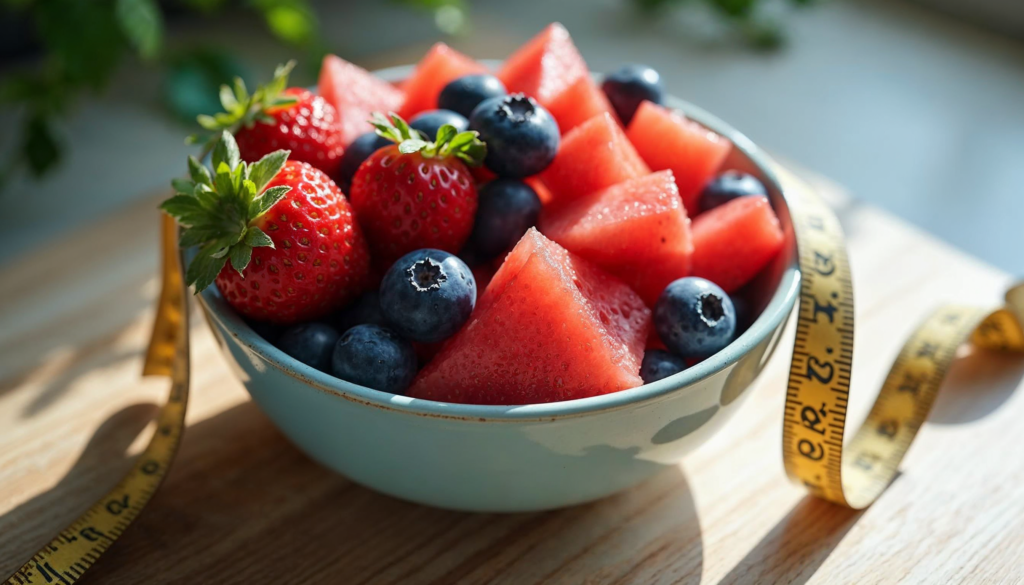
Low-calorie fruits for weight loss work in several ways. First, they fill you up because they contain plenty of water and fiber. This means you feel satisfied without eating too many calories.
Second, they give your body important vitamins and minerals that help keep you healthy while you’re cutting calories.
Many of the best low-calorie fruits offer extra health benefits beyond just being low in calories. For example, berries are full of antioxidants that help protect your cells, while citrus fruits provide vitamin C that supports your immune system.
What Makes a Fruit Low in Calories? A Simple Guide
When we talk about fruits with least calories, we’re usually referring to fruits that contain fewer than 60 calories per 100-gram serving.
These healthy low-calorie fruits give you the most nutrition while keeping your calorie intake in check.
Most fruits with least calories have a high water content (usually 85-95% water), low sugar levels compared to other fruits, and rich fiber content that aids digestion.
Typical Calorie Range
The calorie content of these fruits typically ranges from very low (25-35 calories per 100g) to low (36-50 calories per 100g) and moderately low (51-60 calories per 100g). While healthy low-calorie fruits are light on calories, they’re heavy on essential nutrients:
Vitamins and Minerals
These fruits often provide high amounts of vitamins A, C, and various B vitamins, which support your immune system and overall health.
You’ll find important minerals like potassium, magnesium, and calcium in these fruits, which help maintain healthy body functions.
Fiber Content
Most low-calorie fruits contain 2-4 grams of fiber per serving. This fiber helps keep you feeling full longer, supports healthy digestion, and maintains steady blood sugar levels, making it easier to manage your appetite and avoid overeating.
Additionally, dietary fiber from fruit contributes to heart health by helping to regulate cholesterol levels.
7 Best Low-Calorie Fruits for Your Healthy Diet
When choosing best low-calorie fruits for your diet, these seven options stand out for their low calorie content and impressive health benefits.
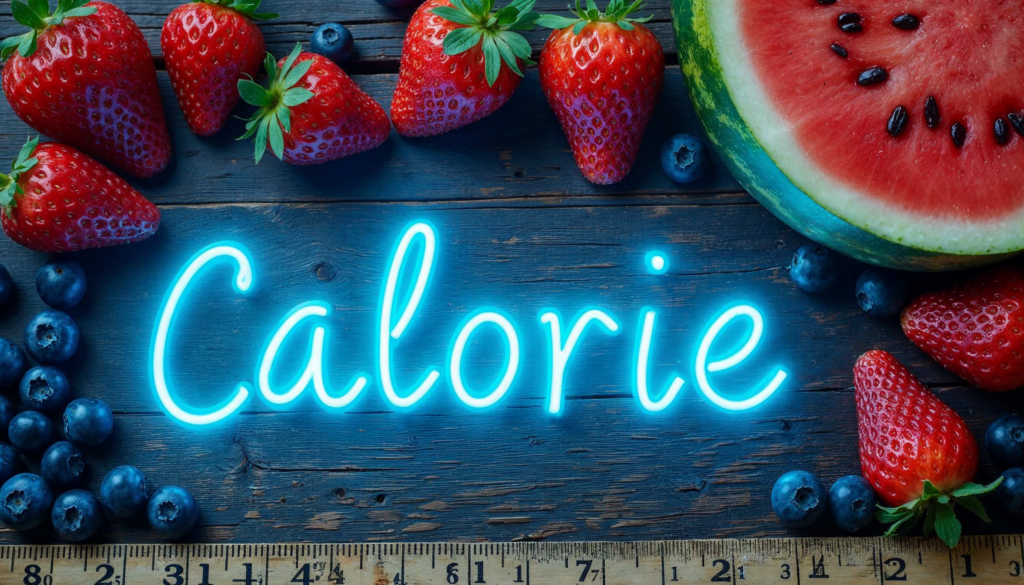
Let’s explore each one, including some fascinating low-calorie tropical fruits.
- Strawberries (32 calories per 100g): Sweet and versatile, strawberries are packed with vitamin C (85mg per cup) and antioxidants. They’re excellent for skin health and immune support. One cup of strawberries provides more vitamin C than an orange, making them a nutritional powerhouse.
- Raspberries (53 calories per 100g): These ruby-red berries are rich in fiber (8g per cup) and contain powerful antioxidants called anthocyanins. They help reduce inflammation and support heart health. Their high fiber content makes them particularly filling despite their low calorie count.
- Blueberries (60 calories per 100g): Often called a superfood, blueberries are known for boosting brain health and memory. They contain 4g of fiber per cup and provide 25% of your daily vitamin C needs. They’re rich in compounds that help protect your cells from damage and support healthy aging.
- Watermelon (46 calories per 100g): This refreshing fruit is 92% water, making it perfect for hydration. It contains lycopene (12.7mg per 1.5 cups) for heart health and skin protection. Its natural sweetness makes it a great dessert replacement.
- Papaya (32 calories per 100g): As one of the star low-calorie tropical fruits, papaya contains enzymes that aid digestion. It provides 157% of your daily vitamin C needs per cup. The fruit also helps improve skin health and digestion.
- Pomegranate (83 calories per 100g): While slightly higher in calories, pomegranates offer 7g of fiber per fruit and 30% of your daily vitamin C needs. They support heart health and have anti-inflammatory properties. Their seeds provide a satisfying crunch and can be sprinkled on various dishes.
- Passion Fruit (97 calories per 100g): Though higher on the calorie scale among these options, passion fruit offers impressive benefits. It contains 12g of fiber per cup and provides 30% of your daily vitamin A needs. Its unique flavor makes it a great addition to smoothies and desserts.
These fruits are versatile and can be enjoyed in several ways: eat them fresh and raw for a quick snack, mix 1/2 cup into your morning yogurt or oatmeal, blend 1 cup of mixed fruits into refreshing smoothies, or toss 3/4 cup into colorful fruit salads.
Remember that while these are among the best low-calorie fruits, even the ones with slightly higher calorie counts offer valuable nutrients and can be part of a healthy diet when eaten in appropriate portions.
Using Low-Calorie Fruits for Weight Loss: A Smart Strategy
Low-calorie fruits for weight loss can be powerful allies in your weight management journey.
These natural foods help control hunger while providing essential nutrients that support your overall health during weight loss.
The magic of low-calorie high-fiber fruits lies in their unique composition. They contain natural compounds that help you lose weight in several ways:
Fiber-Rich Content
Most of these fruits contain 3-8 grams of fiber per serving. This fiber creates a feeling of fullness that lasts longer than many other snacks. When you feel satisfied, you’re less likely to reach for unhealthy foods between meals.
Water Content
These fruits are mostly water (85-95%), which helps:
- Fill your stomach without adding many calories
- Keep you hydrated throughout the day
- Support proper digestion
Blood Sugar Management
Low-calorie high-fiber fruits help maintain steady blood sugar levels because their fiber slows down sugar absorption. This prevents the energy crashes that often lead to unhealthy snacking.
Natural Sugar Content
Unlike processed snacks, these fruits contain natural sugars along with fiber, which helps:
- Satisfy sweet cravings naturally
- Provide steady energy
- Reduce desires for high-calorie desserts
Timing Matters
For the best weight loss results, consider strategic timing of your fruit consumption. Eat them as a pre-workout snack to fuel your exercise, between meals when hunger strikes, as a healthy alternative to dessert, or with breakfast to start your day with good nutrition.
This thoughtful timing helps maximize the benefits while supporting your weight loss efforts.
The Power-Packed Nutrition of Low-Calorie Fruits
While many people focus solely on calories, low-calorie fruits offer an impressive array of nutrients that support overall health.
Let’s explore the nutritional content of several popular options, including the much-discussed nutritional value of huckleberries as a superfood and the nutritional value of avocado per serving.
Nutritional Comparison (Per 100g serving)
| Fruit | Calories | Fiber (g) | Vitamin C (mg) | Other Key Nutrients |
| Huckleberries | 37 | 2.4 | 15 | Iron (0.7mg), Antioxidants |
| Blackberries | 43 | 5.3 | 21 | Vitamin K (19.8mcg) |
| Cantaloupe | 34 | 0.9 | 36.7 | Vitamin A (3382 IU) |
| Plums | 46 | 1.4 | 9.5 | Potassium (157mg) |
| Peaches | 39 | 1.5 | 6.6 | Vitamin A (326 IU) |
| Avocado | 160 | 6.7 | 10 | Healthy fats (14.7g) |
| Grapefruit | 42 | 1.6 | 31.2 | Vitamin A (1150 IU) |
These fruits provide essential vitamins that serve different purposes:
- Vitamin C supports immune function and skin health
- Vitamin A promotes eye health and immunity
- Vitamin K aids in blood clotting and bone health
Fiber Benefits
The fiber content in these fruits plays a crucial role in maintaining overall health. It supports proper digestive function by promoting regular bowel movements and feeding beneficial gut bacteria.
Additionally, fiber helps maintain healthy cholesterol levels by binding to cholesterol in the digestive system, and it provides sustained energy by slowing down the absorption of sugars into the bloodstream.
Special Focus: Huckleberries and Avocados
Huckleberries stand out as a superfood due to their high antioxidant content and impressive nutrient density despite their low calorie count. They contain compounds that may help fight inflammation and support brain health.
While avocados have a higher calorie content, their nutritional value per serving makes them worth including in a balanced diet.
They provide heart-healthy monounsaturated fats, fiber, and nearly 20 different vitamins and minerals.
Simple Ways to Add Low-Calorie Fruits to Your Diet
Incorporating low-calorie fruits into your daily meals is a simple and delicious way to boost nutrition without adding many calories.
Here are practical tips on how to enjoy these fruits in various meals and snacks, including low-calorie fruits for smoothies and low-calorie fruits for a healthy breakfast.
Morning Boost: Low-Calorie Fruits for Breakfast
Starting your day with fruit is easy and energizing. Here are some ideas:
- Fruit Smoothie: Blend a mix of low-calorie fruits like strawberries, blueberries, and watermelon with water or a splash of almond milk. Add a handful of spinach for extra vitamins without changing the fruity flavor.
- Fruit and Yogurt Parfait: Layer low-calorie fruits such as peaches, raspberries, and blackberries with Greek yogurt. Top with a sprinkle of granola or chia seeds for added crunch.
- Oatmeal Topping: Slice a few strawberries or a half-cup of diced apples into your oatmeal for natural sweetness without extra sugar.
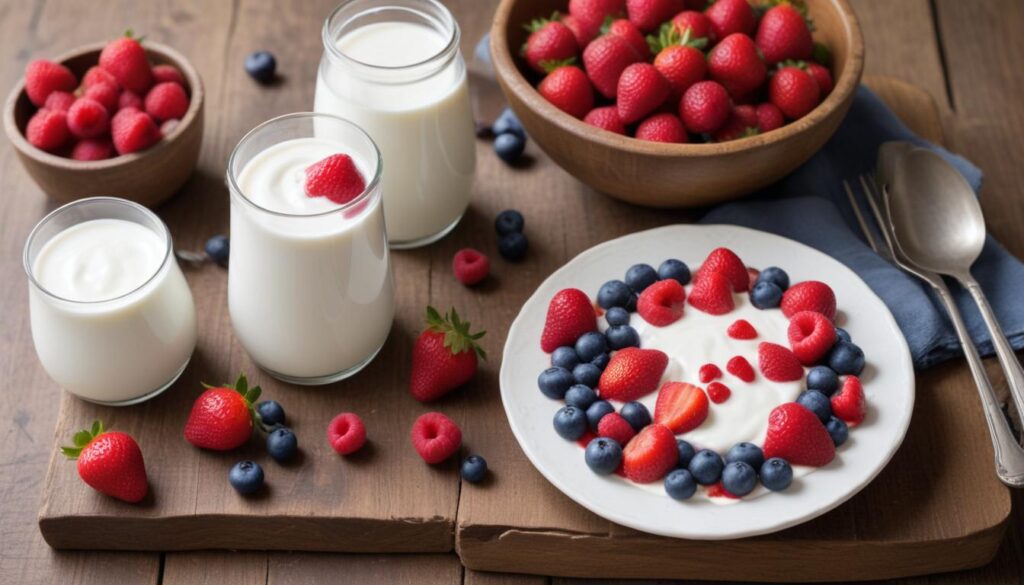
Midday Options: Low-Calorie Fruits in Salads and Snacks
Adding fruits to salads or snacks is a refreshing way to enjoy low-calorie foods throughout the day.
- Fruit Salad: Combine chopped apples, melons, and grapes for a quick and filling fruit salad. These fruits are low in calories and keep you hydrated.
- Green Salad with Fruit: Top your favorite greens with orange segments or a handful of blueberries. The fruit adds a touch of sweetness and pairs well with light vinaigrette dressings.
- Fruit and Nut Combo: Pair a small handful of nuts with a low-calorie fruit like an apple or a few strawberries for a balanced snack that’s high in fiber and keeps you satisfied.
Afternoon Pick-Me-Up: Low-Calorie Fruits for Smoothies
Smoothies are perfect for a refreshing, low-calorie afternoon boost. Try these ideas:
- Green Smoothie with Berries: Blend spinach or kale with blueberries, raspberries, and water. These low-calorie fruits for smoothies add a fruity taste without too many extra calories.
- Tropical Fruit Smoothie: Blend pineapple chunks and a few slices of mango with coconut water. Both are naturally sweet and refreshing without adding many calories.
Easy Meal Planning with Low-Calorie Fruits
Including low-calorie fruits in your meal planning can help you enjoy nutritious meals and snacks that are satisfying without high calorie counts.
Here are some balanced meal ideas that incorporate these fruits to help you make healthier choices.
Breakfast Ideas
- Fruit-Infused Overnight Oats: Prepare oats with almond milk and top with low-calorie fruits like blueberries, strawberries, and sliced peaches. Store in the fridge overnight for a quick, balanced breakfast.
- Avocado Toast with Fruit on the Side: Enjoy a slice of whole-grain toast with mashed avocado, topped with cherry tomatoes. Pair with an apple or a handful of raspberries for a low-calorie fruit boost.
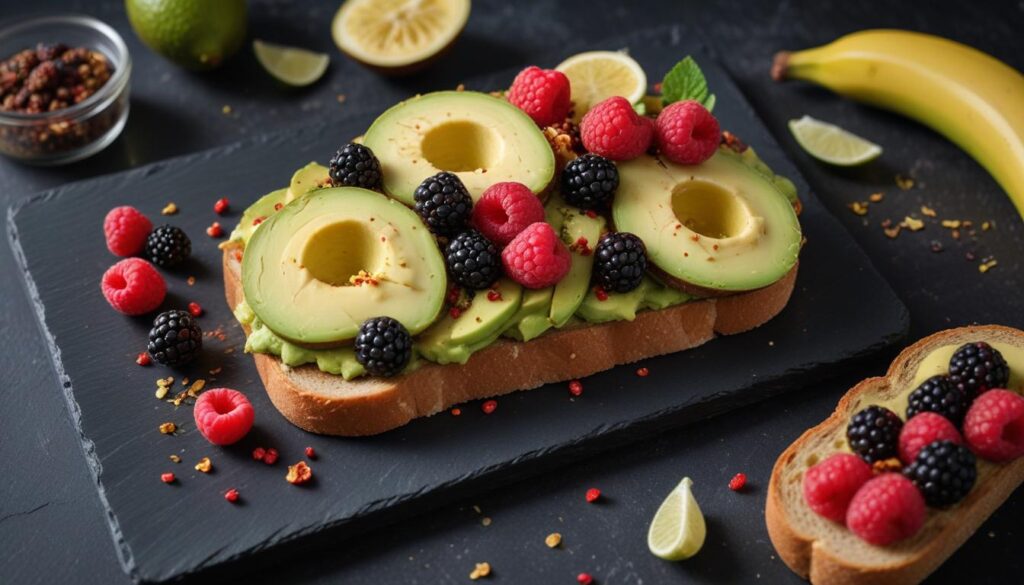
Lunch Ideas
- Spinach Salad with Berries: Toss fresh spinach with a handful of strawberries and blueberries, adding grilled chicken and a light vinaigrette. This meal provides a good mix of protein, fiber, and antioxidants.
- Turkey Wrap with a Side of Melon: Make a wrap with turkey, lettuce, and a small amount of hummus or mustard. Pair it with a few melon slices (cantaloupe or honeydew) for a refreshing, low-calorie side.
Dinner Ideas
- Grilled Salmon with Citrus Salsa: Top grilled salmon with a fresh salsa made from diced oranges and a few mango chunks. This adds flavor and nutrients without heavy sauces.
- Veggie Stir-Fry with Pineapple: Cook a mix of your favorite vegetables (like bell peppers, broccoli, and zucchini) and toss in pineapple chunks for a natural sweetness that balances the dish while keeping it light.
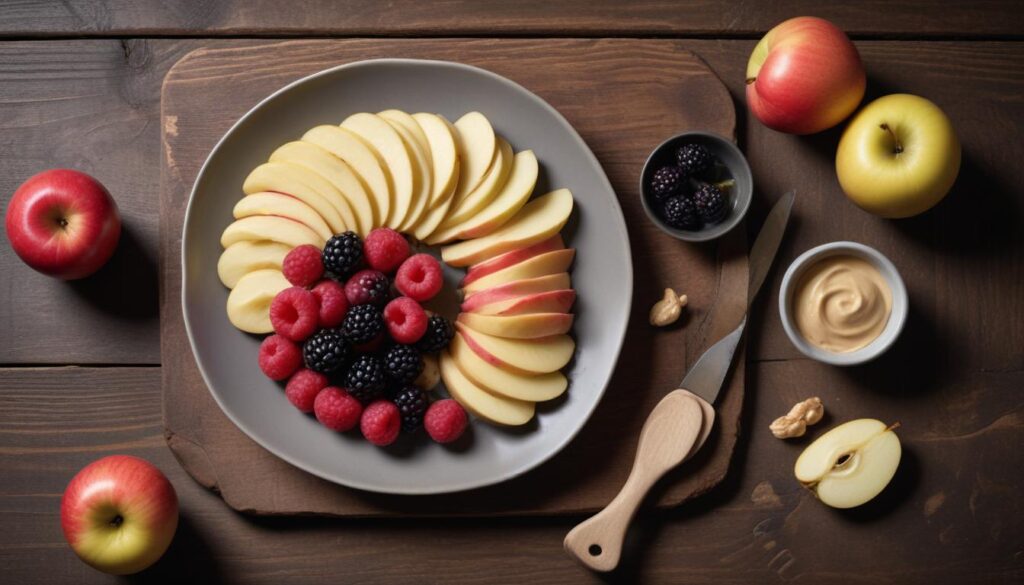
Snack Ideas
- Greek Yogurt with Low-Calorie Fruits: Combine plain Greek yogurt with a few blackberries or raspberries for a creamy, protein-packed snack.
- Sliced Apple with Nut Butter: Spread a small amount of almond or peanut butter on apple slices for a balanced snack that’s satisfying and nutritious.
Choosing Low-Calorie Fruits for a Diabetic-Friendly Diet
For diabetics, choosing low-calorie fruits that won’t cause rapid spikes in blood sugar is essential. Many fruits are naturally low in calories and have a low glycemic index (GI), making them suitable for a diabetic-friendly diet.
Here are some of the best low-calorie fruits for diabetics and tips on how to enjoy them.
Top Low-Calorie Fruits for Diabetics
- Berries (Strawberries, Blueberries, Raspberries): Berries are rich in fiber and antioxidants while being low in sugar. Their high fiber content slows sugar absorption, making them a great choice for steady blood sugar levels.
- Apples: Apples have a low GI and are also a good source of fiber, especially if you keep the peel on. They’re filling and make a convenient snack on the go.
- Pears: With a low glycemic load, pears are safe for diabetics and contain vitamins, fiber, and antioxidants. They’re also hydrating and help you feel full.
- Citrus Fruits (Oranges, Grapefruits): These fruits are high in vitamin C and fiber, especially when eaten whole. They have a lower impact on blood sugar compared to fruit juices and can add a refreshing touch to meals.

How to Include These Fruits in a Diabetic Diet
- Morning Oatmeal Topping: Add a few berries or apple slices to your oatmeal to increase fiber and flavor without adding much sugar. The fiber helps prevent blood sugar spikes.
- Yogurt Parfait: Combine plain Greek yogurt with a handful of raspberries or blueberries. This pairing offers protein, healthy fat, and fiber, which help stabilize blood sugar.
- Side Salad with Sliced Fruit: Add orange or apple slices to a leafy green salad with nuts for a satisfying, nutrient-rich meal. The fruit provides natural sweetness and pairs well with light dressings.
- Fruit with Nut Butter: Pair a few apple or pear slices with a small amount of almond or peanut butter. This snack combines fiber and healthy fats to keep you satisfied longer.
Embracing Healthy, Low-Calorie Fruits in Your Diet
Incorporating healthy low-calorie fruits into your diet is a simple, enjoyable way to support your wellness goals.
From breakfast to snacks and balanced meals, these fruits offer essential vitamins, fiber, and hydration without adding many calories.
Options like berries, apples, melons, and citrus fruits not only satisfy your sweet cravings but also provide nutrients that support overall health.
For those looking to manage weight, low-calorie fruits can be a key ally, keeping you full and energized throughout the day.
Diabetics can also benefit from fruits with low glycemic indexes, such as strawberries, apples, and oranges, which help keep blood sugar levels stable.
Whether you’re looking to add zero-calorie fruits for extra hydration or snack on filling, low-calorie options, exploring these fruits adds variety and balance to your diet.
Embrace the possibilities, experiment with meal planning, and enjoy the health benefits that come from these naturally sweet, nutritious foods.
FAQs About Low Calories Fruits
This FAQ section provides quick answers to common questions about low-calorie fruits, their benefits, and how to incorporate them into a balanced diet. From weight loss tips to smoothie ideas, discover how these nutritious fruits can support your health goals.
What fruits are low in calories?
Fruits like strawberries, blueberries, raspberries, apples, pears, melons (such as watermelon and cantaloupe), and citrus fruits (oranges, grapefruits) are all low in calories. These fruits are not only light in calories but are also rich in vitamins, minerals, and fiber.
Which low-calorie fruits are best for weight loss?
Fruits high in fiber and water content, such as berries, apples, pears, and watermelon, are ideal for weight loss. Their fiber helps you feel fuller for longer, making it easier to manage portions and reduce overall calorie intake.
Are there any zero-calorie fruits?
Technically, there are no true zero-calorie fruits, but some fruits, like watermelon and cucumber, are extremely low in calories and high in water, making them very close to zero in calorie impact.
What low-calorie fruits can I add to my diet?
You can add a variety of low-calorie fruits like strawberries, oranges, apples, grapes, and melons. These fruits can be enjoyed fresh, added to salads, or blended into smoothies.
How many calories are in berries?
Berries are very low in calories. For example, a cup of strawberries has about 50 calories, a cup of raspberries has around 60 calories, and a cup of blueberries contains about 80 calories. They’re also packed with antioxidants and fiber.
Is watermelon a low-calorie fruit?
Yes, watermelon is a low-calorie fruit with about 46 calories per cup. Its high water content makes it hydrating and filling, which is great for those looking to manage calorie intake.
Can low-calorie fruits help with weight loss?
Yes, low-calorie fruits can support weight loss by providing essential nutrients and fiber without adding too many calories. They’re a great way to stay full and avoid high-calorie snacks while enjoying natural sweetness.
What are the best low-calorie fruits for diabetics?
For diabetics, the best low-calorie fruits include strawberries, blueberries, apples, pears, and oranges. These fruits have a lower glycemic index, which means they have a slower impact on blood sugar levels, making them more suitable for a diabetic-friendly diet.
How can I make a smoothie with low-calorie fruits?
To make a low-calorie fruit smoothie, blend together strawberries, blueberries, or raspberries with a base like water or unsweetened almond milk. You can add a handful of spinach for extra nutrients without adding calories. Enjoy a refreshing and healthy smoothie with minimal calories!








